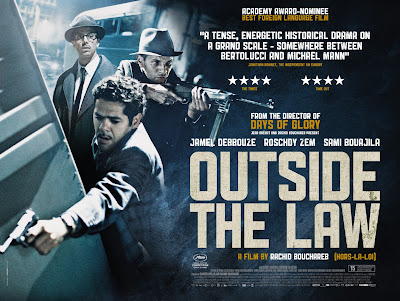Outside the Law is the second part of Rachide Bouchareb’s planned trilogy charting Algeria’s long and troubled history under French control (the first being his hugely successful Days of Glory). Yet where his previous effort won him acclaim for its tribute to the neglected Algerians who fought to free France and it’s colonies from the plight of fascism which spread across Europe during World War II, his recent effort has garnered much controversy with protestors at its Cannes premier and numerous French cinemas refusing to show it. This is deemed to be down to the films pro Algerian standing and Frances much complicated and still unresolved history regarding its occupation of the African country.
We follow three brothers who, after having their home taken away from them by the occupying French authorities whilst only young boys, end up going their separate ways. They eventually meet up again in Paris where they unite in a terrorist campaign against the French government and their continued colonization of Algeria. Each brother’s participation differs greatly but as the stakes rise they must work together if they are to achieve their goal of Algerian independence, despite the severalty of the actions required to make this come to pass.
Bouchareb’s decision to portray these events through a tight-knit family unit, not too dissimilar from the family dynamic of The Godfather (including a strong emphasis on how external actions can affect the internal balance of a household and its local community) must be commended as it’s certainly an interesting and unique way of re-telling these events. However despite his obvious sympathies to the youngest brother (a man who manages to thrive financially within Paris despite the apparent difficulties for young Algerian men there), you can’t help but feel this is an incredibly one sided film, who’s depiction of these men as righteous martyrs makes it difficult to connect on the emotional level that is intended and falls miles away from being the grand scale, tense, energetic historical drama it aims to be.
The fundamental problem of pacing certainly doesn’t help either. The bloated narrative leaves little room for the external factors which ultimately drive these characters to be truly explored. It leaves the very barbaric acts they perform coming across more like an underworld feud than a politically driven military coup. It’s an unfortunate stumbling block that further prevents us for feeling compassionately for these characters and thus making what should be a very emotive and rousing conclusion (full of action and excitement), come across as incredibly underwhelming.
Your background knowledge of this subject matter will no doubt dictate your level of enjoyment of Outside the Law. Yet a film should always overcome these issues if it’s to work on a global platform. Bouchareb may have been successful in creating a controversial movie about the violence surrounding Algerian independence but external sympathies will be few and far between as ultimately, he fails in creating a story gripping and emotive enough for those without a background knowledge of French history to be able to overcome the violence committed and pivotally engage with these characters he has elected to make his focal point of this resistance.


No comments:
Post a Comment